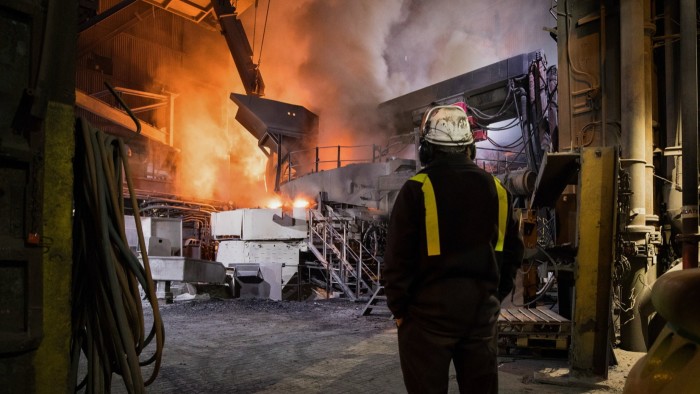Unlock the Editor’s Digest for free
Roula Khalaf, Editor of the FT, selects her favourite stories in this weekly newsletter.
UK taxpayers are propping up four out of six of Britain’s steel companies as the government takes an increasingly interventionist approach to the struggling industry.
Sanjeev Gupta’s Liberty Speciality Steel became the latest to require the government to intervene this week, just four months after the state took control of British Steel. Labour has also provided £500mn subsidy to Tata Steel and a further £426mn to Sheffield Forgemasters, which the state has owned for four years.
The UK steel sector is struggling in the face of high domestic energy prices, US tariffs and a glut of steel on the world market.
Union leaders are pushing the government to use its long-overdue steel strategy, expected this autumn, to reshape and consolidate the industry so it has a greater chance at a more stable future, rather than lurching from crisis to crisis.
The government’s Official Receiver has taken control of Speciality Steel, which was wound up this week. Restructuring advisory firm Teneo is acting as the special manager while a search for a rescue buyer continues.
The government’s decision to step in and oversee Speciality Steel’s insolvency comes after it seized control of British Steel earlier this year.
Despite the state’s role in overseeing the Official Receiver, the government does not own Speciality Steel or have a direct say in its management. However, the government is funding the wages of 1,450 people employed by Liberty Speciality Steel across six sites in Rotherham and Sheffield, the running cost of the plants and the fees of Teneo’s advisers.
Roy Rickhuss, general secretary of steelworkers union Community, said: “We welcome the government’s intervention which is yet another demonstration of our Labour government’s commitment to delivering for steelworkers and our vital foundation industry.
“However, in taking control of the business the government has assumed responsibility for our livelihoods and our communities, and we will of course be holding them to account.”
A government spokesman confirmed that all the fees would be funded for the next two weeks out of the Department for Business and Trade’s internal budget.
Court filings indicate Speciality Steel had an immediate cash need of £3.7mn to cover staffing costs and required a total of £6.8mn for cash flow over the next four weeks.
Speciality Steel’s site is “effectively mothballed” with no customers placing orders for the past three months, Gupta’s advisers told the court this week. As a result, the government will also be bearing the cost of getting the site up and running again.
The funding situation would be reassessed in a fortnight amid government hopes that a rescue buyer could be found, the government spokesman said.
If a buyer is not found, the government will have to consider whether it can stretch the department’s budget further or whether it has to tap the National Wealth Fund, which has already been repurposed to provide the bulk of funding for the Sizewell C nuclear project. The government has already committed up to £2.5bn through the National Wealth Fund for the steel industry, which is seen as critically important for the defence sector and the transition to clean energy.
The role of special managers at Speciality Steel differs from the situation at British Steel, where the government used emergency legislation to take control in April after its Chinese owner, Jingye, threatened to shut down its Scunthorpe site with the loss of thousands of jobs.
London’s High Court has granted Teneo wide-ranging powers to manage Speciality Steel. These include the ability “to employ and remunerate or dismiss any employees at their discretion” and “to discontinue any part of a business when desirable in the interests of the estate”, according to a court order made on Thursday.
 The Port Talbot steelworks. The government last year provided a £500mn subsidy to Tata Steel to help transition the Port Talbot site to an electric arc furnace © CW Images/Alamy
The Port Talbot steelworks. The government last year provided a £500mn subsidy to Tata Steel to help transition the Port Talbot site to an electric arc furnace © CW Images/Alamy
The government last year provided a £500mn subsidy to Tata Steel to help transition the Port Talbot site to an electric arc furnace. Two months ago it handed a further £426mn to Sheffield Forgemasters in a recapitalisation. Forgemasters was nationalised via the Ministry of Defence in 2021.
Cardiff’s 7 Steel and Marcegaglia in Sheffield are the only primary steelworks in Britain that have not had government intervention.
The previous government pumped more than £600mn into British Steel between 2019 and 2022 to keep it trading, after its liquidation and before the sale to Jingye Steel.
Rickhuss said a lot of damage had been done to Britain’s steel industry through fragmentation over the years. “There is an argument to be made to put Liberty Steel’s assets together with those of British Steel”.
Recommended
A government source insisted there were no current plans to take control of Liberty and highlighted that the court had heard there had been expressions of interest from buyers.
The government is expected to detail its Steel Strategy by the end of this year, after it was delayed from its initial spring timeline by British Steel’s crisis and US President Donald Trump’s shock tariffs on the industry.
Even before the imposition of the tariffs, the sector was in decline, with domestic crude steel production last year falling to just 4mn tonnes — the lowest total since the Great Depression of the 1930s.

